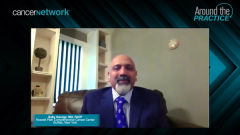
ADT Therapy in Prostate Cancer: Agonists vs Antagonists
Expert perspectives on the use of LHRH agonists versus antagonists in the management of prostate cancer.
Episodes in this series

Transcript:
Robert Dreicer, MD, MS, MACP, FASCO: Dr Scholz, we know that [approximately] 90% of testosterone that circulates in a human male originates from the testes, and we suppress the majority of that by the approaches that we’ve discussed. The LHRH [luteinizing hormone–releasing hormone] agonists [and the] LHRH antagonists—the agonists were developed first because chemically, in terms of making the drugs do it, it was easier. We all recognize that from a physiologic perspective, the antagonists are cleaner but because they’ve been difficult to develop, and although there is an oral formulation and a parental formulation, long-term depots are not available. When you talk to your patients about the differences in these 2 approaches, how do you explain it to patients, and how do you think about this?
Mark Scholz, MD: My general response is to look at it through the eyes of the patient experience. [Sometimes] the patients will get rashes with Firmagon [degarelix]. You have to come in every month for a shot. Relugolix has an oral delivery form that we can give indefinitely. I have patients all over the country [who] we can prescribe these things over the phone [for], and they don’t even need an office visit. What’s attractive about these agents compared with the older agents, such as leuprolide, is the immediate decline in testosterone, which, with early-stage disease, may not be that material or concern.We have these newer agents that cause an immediate decline in testosterone, it’s clinically more attractive.
Firmagon has the disadvantages of requiring monthly injections instead of extended injections. Sometimes there’s a reaction in the skin—in the abdominal wall, where it’s injected—which can be unpleasant. The newer agent, the pill, is attractive to patients because it doesn’t have the inconvenience factor of the monthly shot. Generally, it seems more desirable to get an immediate decline in testosterone rather than having a testosterone level that floats down to 0 over about a month. We’ve been able to deal with that in the past by using other agents to block testosterone with other oral agents, such bicalutamide, but the truth is that we have many options. Many of these refinements have to do with reimbursement, convenience of use, and other factors, because they’re all effective.
Robert Dreicer, MD, MS, MACP, FASCO: To round out the conversation here, when we talk about there being a fair amount of discourse about the role of antagonism and agonist agents, there’s no comparative data. We don’t have any rationale to say that one approach is different than the other. There has been a suggestion that there may be differences in cardiovascular morbidity risk. The relugolix phase 3 trial [NCT03085095] suggested that although subsequent studies with all the complications have not necessarily validated that, it would be safe to say that—based on the current state of knowledge, as Dr Scholz mentioned—we have several choices of how to approach patients with androgen deprivation therapy. The optimal way is not established, and therefore, for selected patients, one approach may differ than the next without necessarily being an advantage in terms of overall disease control.
Transcript edited for clarity.
Newsletter
Stay up to date on recent advances in the multidisciplinary approach to cancer.











































